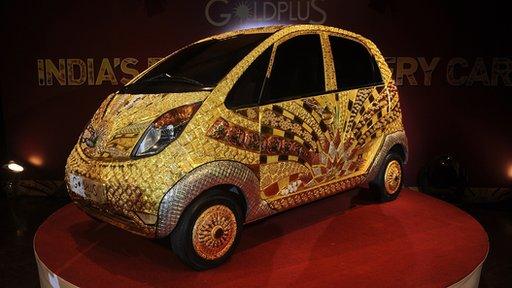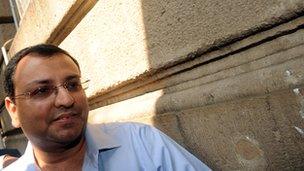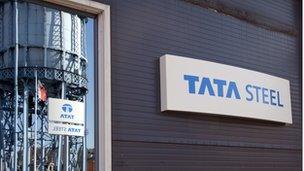Can Mistry transform Tata's global brand?
- Published

Will Cyrus Mistry inherit a glittering jewel or an underperformer?
When Ratan Tata took over in 1991, the Tata Group's revenues were a mere $5.8bn (£3.7bn) - and now they have grown to $83.3bn.
From a company once restricted to Indian shores, nearly two-thirds of its revenues now come from abroad.
Started as a textile business in 1868, the group now comprises more than 100 operating companies in several sectors including tea, information technology, automobiles, steel and chemicals.
Its companies export products and services to 85 countries.
They employ more than 425,000 people worldwide, including more than 45,000 workers in the UK.
That is the company Cyrus Mistry will inherit in December 2012.
It was under chaotic conditions that Ratan Tata took over the reins of India's prized corporate group.
Corporate watchers say that one of his first challenges was to fight older and more experienced bureaucrats within the organisation and bring in a professional structure to the company.
Ratan Tata is credited with changing the attitude of the organisation - both within the group and outside the group.
As the country accepted globalisation, so did the group. He took the slow-growing, old-fashioned company and turned into an aggressive force that actively began acquiring smaller companies around the world.
Key acquisitions
Aggressive acquisitions changed the way the group grew.
A small tea company in India, Tata tea made an ambitious move in acquiring an iconic UK brand, Tetley Tea, for $450m in 2000. The deal was the largest takeover of an international brand by an Indian company.
The next big move came from the group's steel division. Tata Steel acquired Corus, an Anglo-Dutch firm, which made the Tata group UK's biggest manufacturer.
Tata Motors then went to pay $2.3bn for the purchase of luxury car brands Jaguar and Land Rover in 2001.
"These acquisitions are absolutely vital to helping Tata achieve status as international company," says Morgen Witzel, author of Tata: The Evolution of a Corporate Brand.
He adds that if you look at the long term, you can see the potential of these acquisitions.
The deals "represent an opportunity to learn. This means acquiring new technology, but also gaining experience of operating in overseas markets".
Cyrus Mistry's challenges
To ensure that the new investments start delivering returns on capital will be one of the big challenges for Cyrus Mistry.
While he is taking on a company that has established itself as a major global player, there is growing uncertainty about the times ahead, not least due to a volatile economic environment.
India's economy is going through a difficult phase. Industrial activity is slowing down, food and fuel inflation has been growing. Rising prices have been driven by falls in the rupee, which is at its lowest level against the dollar.
Internationally too, things are not looking great. The slowdown in the West will have a serious impact on Tata's revenues.
The bulk of the profit comes from the top companies like Tata Consultancy Services (TCS), Tata Motors and Tata Steel.
Rishi Sahai, director at Indian consultancy firm Cogence Advisors, says there is a "need to reduce their dependence on these companies for profitability and develop other businesses as engines of growth for the future".
While the steel industry has been hit by weaker demand, the telecom company is competing in an already crowded market in the country.
Ratan Tata's dream car, the Nano, is another problem. A cheap car designed as a safer alternative for Indian families commuting on two-wheelers, it was expected to take Tata Motors to the number one slot.
The company set an ambitious target of one million cars per year but it has failed to take off in the way they expected.
Debt will be another big concern for Cyrus Mistry. The Corus and JLR deal have left the two companies with $14bn of net debt.
Mr Sahai says: "The acquisitions were mistakes of the past given that they were paid for by expensive debt." He adds that a bigger worry is that "the group has an average track record of integrating these acquisitions in a profitable manner".
But some like R M Lala, the renowned chronicler of the Tata family, say in the long run it is not going affect the overall group.
He says: "Corus in Europe is financially a separate entity from the main Tata Steel, India, and they are working very hard to surmount the present global financial climate."
Tata's multiple group companies generated revenue of $67.4bn but turned profits of just $1.7bn. Many of the companies are small and contribute to barely 10% of the group's turnover.
Shareholders would definitely like to see a much bigger profit.

Some feel Cyrus Mistry is best placed to make the Tata brand truly global
They will be happy because Cyrus Mistry is the son of Pallonji Mistry, the single largest shareholder in group holding company Tata Sons.
Mr Witzel says: "The Tata name gets lots of recognition, but awareness of what Tata is and does is for the most part quite low. That has to change if Tata is going to continue on its current trajectory towards greater internationalisation."
One way that they can do that is by changing the way the brand is perceived.
Many here feel that Cyrus Mistry is best placed to do that. A trained civil engineer from the Imperial college and a graduate from the London Business School, he is an Irish national.
His father Pallonji was listed as the richest Irish national in the world by Forbes.
Mr Lala says that people in India still see it as an Indian company running a global business. And that is a problem.
But Mr Witzel says it is changing, and has been changing slowly over the last 20 years.
Though the mindset of the group is very different now from when Ratan Tata took over, it still "depends which bit of Tata you look at. I think TCS and Tata Telecoms are very much international in their outlook, Taj Hotels too. Other parts of the group are still making the journey".
Untapped potential?
But there could some interesting areas for Cyrus Mistry to explore.
Retail is one. The government of India has finally opened up the retail sector and now allows up to 51% foreign ownership of multi-brand retail stores.
The group's retail operations are through Trent Ltd and the privately owned Infiniti Retail, which operates a chain of multi-brand electronics stores under the brand name Croma.

Tata Steel and other companies in the group have acquired companies around the world
They have a tie-up with the Australian retail giant Woolworths for technical support and sourcing facilities. Trent operates hypermarkets under the name of Star Bazaar which use UK retailer Tesco's help with their supply chains and infrastructure management.
Tata Global Beverages is looking at bringing the US coffee giant Starbucks to India.
Given the strength of the group, the Tatas have not been able to exploit the retail market effectively. That could change under the leadership of Cyrus Mistry.
Aviation is the other. Ratan Tata unsuccessfully tried to enter civil aviation in partnership with Singapore Airlines in the late 1990s.
Mr Tata has said that 100 years from now, he expects Tata to be much bigger than it is now and he hopes that the group will spread its wings far beyond India.
Mr Witzel says: "This is a time of transition for Tata, certainly. But whatever happens, I don't think Tata will lose its essential Indian character. At least I hope not, because I think that being Indian is part of what makes Tata unique and special."
It could even be a decade of slowdown, according to some experts. But the Tata group is known for its innovation in products and services, whether it is in the auto sector with the Tata Nano or the consumer product Swach, an affordable water purifier.
So going global using the frugal innovation that the company has perfected in India will be the key for Mr Mistry.